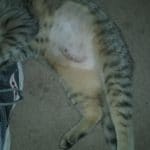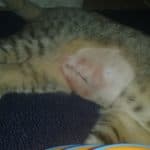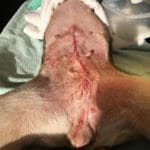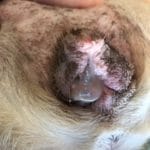I like fortiflora (available over the counter) or proviable. The world of probiotics in vet med is very poorly overseen or regulated so stick to a credible manufacturer. If you have questions let me know. Ideally a healthy dog on a good diet with an adequate exercise plan and emotionally balanced home life shouldn’t / doesn’t need them. (In my opinion).
my 8 year old beagle has a re-occurrence of IVDD. He has had surgery in his lumbar, thoracic and cervical areas – all within 2 years. His most recent 2 surgeries were thoracic in June 2019 and cervical in August 2019. He is now displaying symptoms of another disc problem. Help. Surgery is not an option anymore. He moving his back legs but seems to be getting worse. We have confined him but …. I don’t want him to have a life of paralysis. Is there light at the end of the tunnel here if we stick with conservative treatment. He does not appear to be in pain. We have been in contact with our regular vet but he can only do so much. Our neurologist always says the same thing to get an MRI and the MRI is another $2,000. I hate to bring money into this as a factor but I really think this will continue to happen. He lost over 12 pounds, got his harness, restricted his activity. We thought we did the right things. Has anyone had similar experiences. What about a doggie wheelchair. Any thoughts.
Comments
Preferably Dr Magnifico (our vet)
I am wondering about prebiotic and probiotic to help with a healthy digestion for our 3 dogs. Do you recommend and if so, what brands?
I recent watched this video below and it all made sense to me but his brand is kinda expensive. Between eating grass, eating poop, stinky breathe and itchy skin, my dogs could all benefit if it’s true.
https://caninecodes.com/index_191127A.php?n=fb
Comments
Hello! I rescued a stray domestic shorthair that came crying at my door about 6 months ago and named him Koda. He is the sweetest boy of about 5 years (not too sure about his age though) and I am so grateful of the love he has shown me. Since I’ve had him, there has been nasal discharge on one side of his nose. He began sneezing after a while and I noticed large chunks of hardened mucus would come out. I took him to the vet and he was put on antibiotics and they cleared out most of the build up. The vet also did an x ray and it showed that one side of his sinuses were completely backed up with mucus, so he did a blind bioscopy to look for polyps and could not find anything. The antibiotics seemed to work at the time, but now looking back I’m assuming it was because the they had cleared out most of the mucus, because the symptoms came back after about a week after stopping antibiotics. We are now looking at constant snoring sounds, occasionally gasping for air, sneezing and decreased appetite due to not being able to smell his food. The vet recommended us to someone that had the proper technology, which would be a scope and a ct scan to go in and look for any polyps, and remove them if found. This would cost me $1500-$3000 which I cannot afford since I am a college student 🙂 I went anyways to get their opinion and stupidly spent about $1000 on more testing, appetite stimulants, and more antibiotics that didn’t work. I am considering trying steroids to try and lessen the symptoms just so that he can have an easier time breathing if they worked, but I am afraid of the cost and especially the side effects, if it it doesn’t help that will be more wasted money. Recently, the nasal discharge has spread to the other nostril and he has more bloody mucus than ever before, and as of three days ago, a mucus-like mass has protruded from one nostril and has slowly turned black and bloody over these few days. I tried to remove it but it was very stuck and started bleeding, and I could tell the poor baby was in pain. It may be a polyp that has slowly moved out of his nose, so I will be calling a vet tomorrow to hopefully get it taken out.
I am looking for another opinion on what might be going on or of any similar stories. If anyone knows any good vets in the Tampa, Florida area I would be forever grateful. I am willing to take Koda anywhere in Florida if it means I can find help for less money or just more straightforward people who care about animals and not just the money! Koda is still a happy and loving cat but he has slowly become less playful, and I can tell he does not feel his best becsause of all of this. I am afraid of how much worse it can get. Thank you so much for any help in advance!
Comments
Hi,
I took my 15 year old cat to the vet because she wasnt eating. He gave her a shot for nausia and 1/4 tablet of mertazapine. It has been over 12 hours and still has no interest in food.. She has not gotten blood work yet. But I cant get to the vet untill Monday, it is Sunday. What should I do? Thank you
Comments
My 6-year-old cat has recently had some trouble breathing. She gets a deep sounding snore when breathing in and can’t seem to take a complete breath. The snoring only seems to occur when she is breathing in, and not out. The snoring does sometimes stop. This mainly happens when she is sleeping, her breaths are softer and she seems to be able to breath better. I have also noticed that when I hold her mouth open a little bit, she is able to breathe in and out without any problem. She occasionally has sneezing fits, but they are very rare to see. There is no discharge from her nose, eyes, or ears. She actually has a very dry nose. I have also noticed that she has been eating less than before, but she is still able to eat and drink water. We took her to a vet, but they told us they would only be able to diagnose her with an endoscopy, which they said would cost us around $1,300. I’ve looked online for symptoms similar to hers and cats that had similar breathing patterns/sounds. The closest thing I have been able to find is something called a “nasopharyngeal polyp”. I’m a little lost on what to do. Should I continue with the first vet, and get a concrete diagnosis? or get a second opinion and maybe bring up what I found while researching online? The cost of the first vet is kind of high for me as I’m a college student, but If it is what my cat needs to be able to breathe comfortably again I’ll pay it.
Comments
We have a lab almost a year old. She wont eat out of her bowl. She will eat the dog food if we put it in our hand but she wont eat it out of her bowl. She will eat other treats and table food. She also seems very lethargic per her usual self. We have been watching to make sure she is still pooping but something just seems off. What should our next steps be? Should we try changing dog food? Could she be going into heat?
Comments
I just had my 5 month old kitten spayed on Friday Dec 13, 2019. On Sunday there was a good amount of bruising. Today is Thursday and day 6 of recovery and there is a bump a little smaller than a ping pong ball that is under the stitch line. Does this look like it is just a fluid sac or do you think a hernia? She runs, jumps, is and has been very active, eats, pee, poop, everything else is normal. I push on it and no reaction from her, there is no fever to it either.
First picture is the bump on day 6. Second picture is her stitches on day 6 of healing. Third picture is what her belly looked like on Day 2 and 3 after spay.






















Hello,
I’m sorry to hear about your pup. I always tell my clients to never lose hope. Trying to make a decision as to whether or not to proceed is a personal one. I can’t answer it for you and no one else should either. I have known some dogs to do very well with weakness or paralysis. But it takes a dedicated family and lots of TLC. I tell people to give it two to three weeks IF they can manage pain and the care it entails. I hope this helps and I wish you the best.
Thank you for your message. Have you ever heard of dogs with recurring IVDD. We are both committed to doing what we have to do. We are both home full time. We have decided this is not about us but about Kody. Is there something in addition to IVDD like a progressive form of this disease that some dogs have that would cause multiple episodes so close to each other. My husband thinks he is pre-maturely aging.